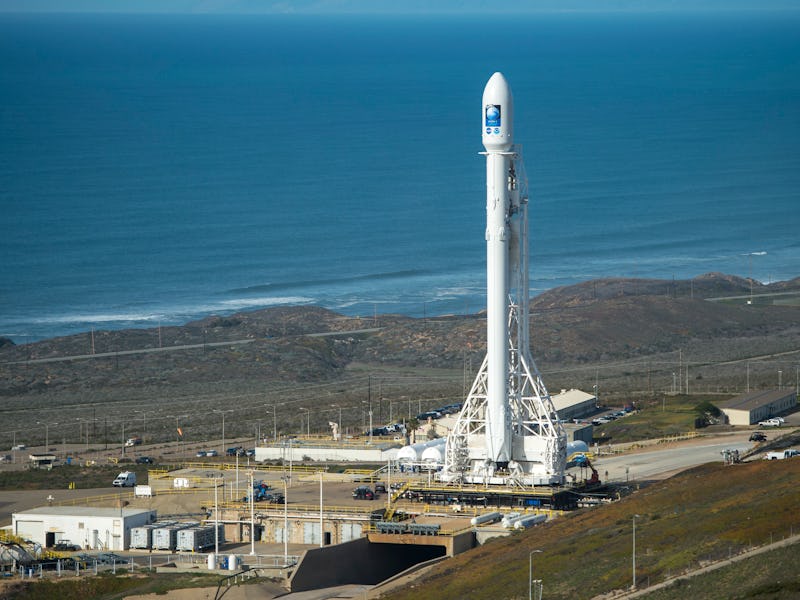The Success of Commercial Space Hinges on Making a Profit

Although companies like SpaceX, Boeing, and Blue Origin have been stringing together a series of successes over the last few years, the commercial space industry is perhaps not in the healthiest state — mainly because it’s not yet profitable.
“You have to be able to make a profit through space,” said Michael Griffin, chairman and CEO of the technology company Schafer Corporation. At a panel discussion about the free market space industry hosted by the American Institute Of Aeronautics And Astronautics’s annual Explore SPACE Forum on Tuesday, Griffin and other private spaceflight experts debated what the role of government should be in helping private companies take a bigger role in low Earth orbit (LEO) space operations.
NASA’s long-term goals include handing off LEO to the commercial sector so that it can focus on deep space missions like the journey to Mars. In order to speed this process up, the government has been actively partnering with the private industry to develop cheaper launch and spacecraft technology. But there’s disagreement as to whether or not the government is getting the most out of its investments.
“A better role for the government in helping to stimulate this area is to pay for outcomes, not processes,” said Griffin. He means that currently, the government is more inclined to give contracts to companies like Boeing, SpaceX, and others on the premise that they will be building some sort of new system or technology and testing it out, rather than effectively fulfilling a requested task or mission.
It’s an oversimplification — after all, part of SpaceX’s contracts are to fulfill resupply missions to the International Space Station, which they have done so successfully. But Griffin makes a good point — the money is not necessarily earmarked strictly for the accomplishment of these missions, but for the continued development and testing of the technology as well.
And that means failures can come at the federal government’s dime. SpaceX’s 2015 accident delayed a much-needed ISS resupply mission, setting NASA ISS operations back by many months. The company’s launchpad explosion just two weeks ago wasn’t necessarily detrimental to NASA — until you realize most the money SpaceX runs its operations with comes from federal contracts.
“I can’t see SpaceX making a profit,” said Griffin. Nor is he a big fan of many of SpaceX’s competitors. “I’m not as much of an admirer in what Jeff Bezos is doing,” he said, arguing that Bezos runs his company, Blue Origin, like a billionaire indulging in a strange obsession with space. “I’m not sure it’s commercialization.”
And that brings up a critical idea: what is commercialized space? For Griffin, it’s not Boeing and SpaceX and Blue Origin. It’s setting up broadband internet services from LEO; launching GPS and imaging instruments into orbit, and so forth. In his view, these are the kinds of services and operations that companies can currently take over to generate revenue and make real money off of.
For Griffin, NASA and the government should not be paying for increased private development as an end goal, but instead “pay for performance.”
Of course, getting something like this to work requires a better, more complete regulatory framework than what we have now. Bruce Pittman, the chief system engineer, for NASA’s space portal at the agency’s Ames Research Center, thinks in order to attract more LEO customers, one needs to explicitly address what’s allowed and what isn’t. He calls the 1967 Outer Space Treaty still too vague and too “open to interpretation.”
For example, if a company goes bankrupt and is forced to abandon their orbital vehicles in space, “who assumes the liability?” asks Pittman.
Perhaps the government could play a role in underwriting that liability, suggested Chris Ferguson, deputy program manager and for Boeing’s commercial crew program. Limiting the liability bestowed on a service provider is an easy way to offset the risks and fears commercial companies have about entering LEO space, without forcing the federal government to put money upfront.
That’s perhaps one of the biggest obstacles to the commercialization of LEO space: fear of bad publicity in the face of failure. “When things go wrong in space, they can go wrong in a very public and very expensive way,” said Griffin. Companies like SpaceX are unafraid of publicly failing — but a smaller company, if they cannot prove they are making money, is simply going to lose investors if they experience disaster. There’s simply no hiding mistakes. The only way to offset the negative effects of a public accident is to show the public the money.
In any case, LEO has some ways to go before the private sector can fully divvy it up amongst themselves. Even now, the beginning signs are there. “It looks like the Wild West of space exploration out there,” said Ferguson.